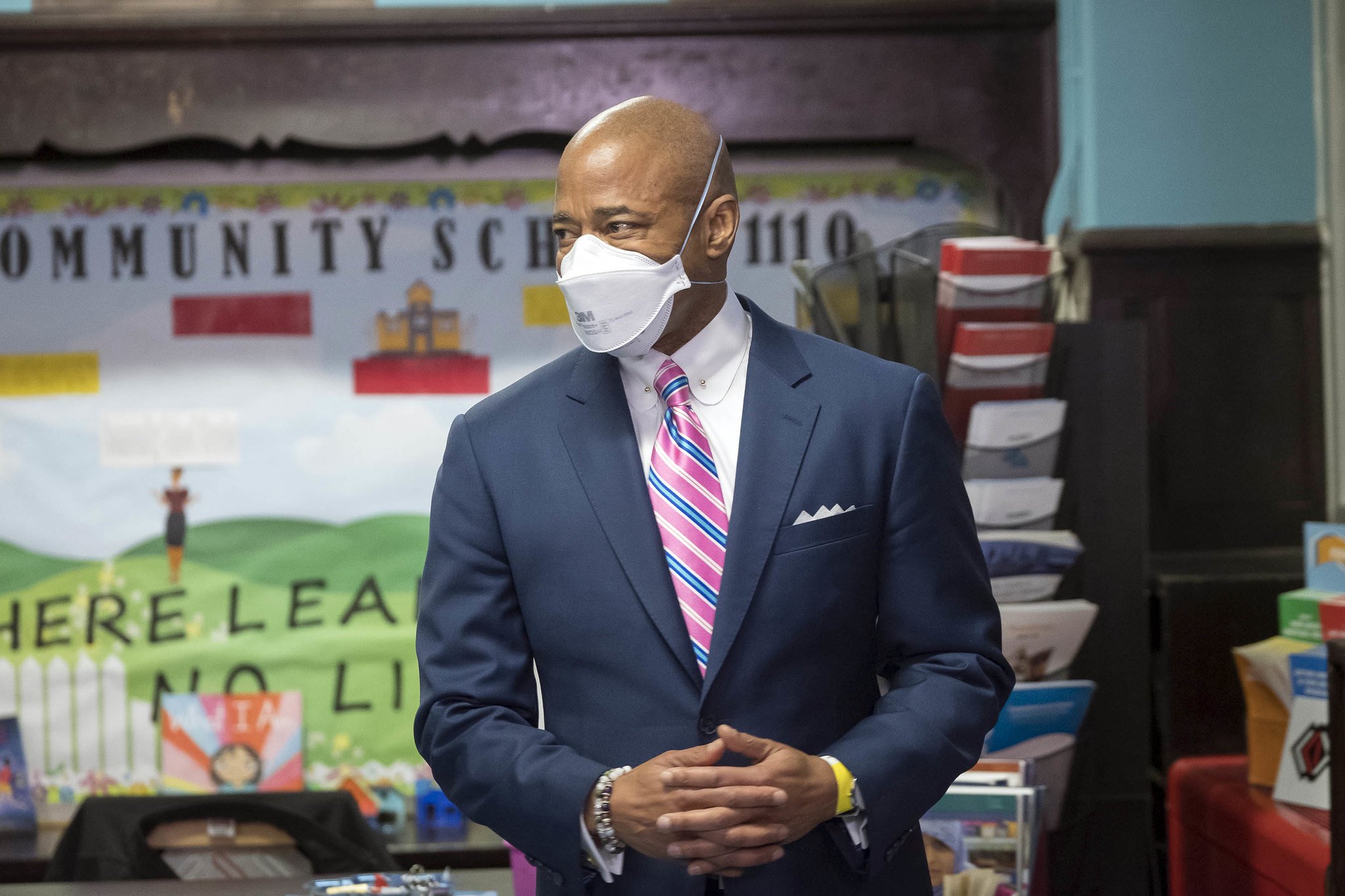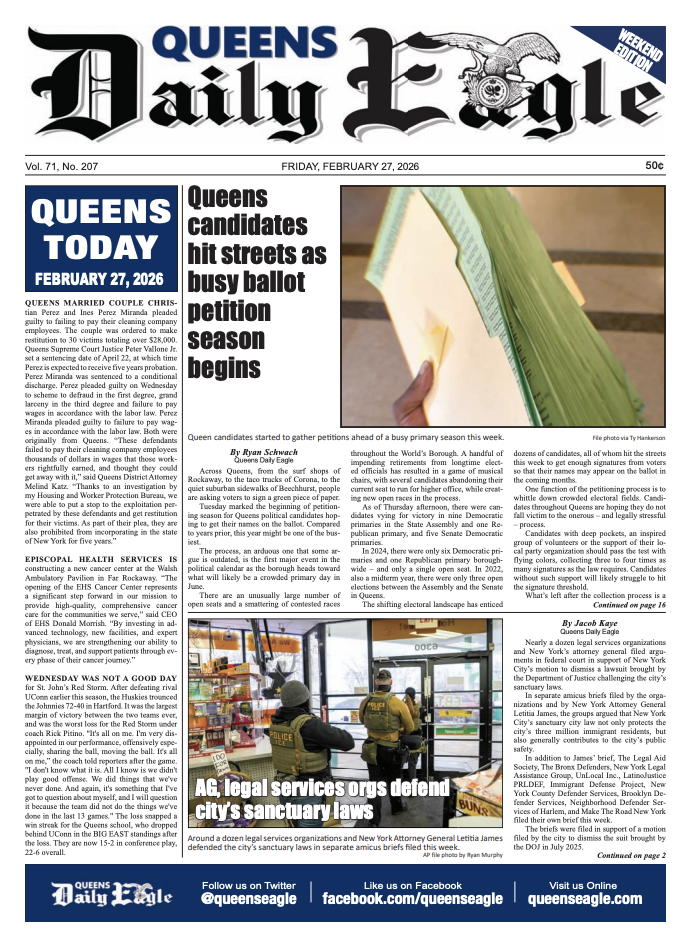New Yorkers voice support for rolling back bail laws
/Mayor Eric Adams has expressed concern over bail laws in New York. A new poll from Siena College shows that 65 percent of respondents felt that bail laws should be tightened up. Photo by Ed Reed/Mayoral Photography Office
By Jacob Kaye
A majority of respondents to a new poll from Siena College said that crime in New York is of serious concern and that, in order to address it, lawmakers should roll back bail reforms.
Of the approximately 800 people polled by Siena College in a poll released Tuesday, 60 percent said that crime was a “very serious” concern throughout New York State. That number dropped significantly – by over half – when respondents were asked whether or not they felt crime was a serious concern in their own communities.
“New Yorkers say crime is a serious problem across the state. More than half of every demographic group say it is a very serious problem and at least 84 percent of every demographic say it is at least a somewhat serious problem,” said Siena College pollster Steven Greenberg.
“Voters see crime in their community as a serious problem, although more than one-third say it’s not very or not at all serious,” he added. “However, a majority of every demographic group says crime in their community is a somewhat or very serious problem, with the exception of downstate suburbanites, ‘only 45 percent’ of whom say it is.”
Despite the difference in respondents’ perception of crime at home and throughout the state, a majority of those polled said that bail laws should be changed to give judges more discretion, the poll said.
Around 2 percent of nearly 100,000 cases between July 2020 and June 2021 led to the rearrest of the defendant on a violent felony charge while the defendant was out on bail for a previous charge, according to the Office of Court Administration. In the same time period, around 20 percent of all people released on bail were rearrested for any type of crime.
Sixty-five percent of respondents were in support of changing the bail reforms, an idea pushed by a number of lawmakers on both sides of the aisle, including Mayor Eric Adams, in recent months.
At 88 percent responding ‘yes,’ Republican voters were more in favor of changing the bail laws than Democrats. Still, over 55 percent of Democrats polled supported changing the laws.
The biggest difference in opinion on the bail laws came along racial lines. Around 73 percent of white New Yorkers polled said they were in favor of giving judges more discretion when setting bail, compared to 44 percent of Black respondents and 48 percent of Latino respondents.
When asked if “the law should not be amended to give discretion on bail back to judges because it could once again lead to people of color being disproportionately denied bail,” 21 percent of white respondents said ‘yes,’ compared to 40 and 41 percent of Black and Latino respondents respectively.
“Nearly two-thirds of New Yorkers – including strong majorities of Republicans, independents and Democrats, upstaters and downstaters – support amending the 2019 bail reform law and giving judges more discretion to keep dangerous criminals off the streets,” Greenberg said. “Voters of color and young voters are more closely divided.”
Race was a major factor in the creation of the bail reform laws, which passed in 2019 – the laws, in part, eliminated cash bail for defendants facing most misdemeanor and non-violent felony charges. Advocates and lawmakers in support of the changes cited racial and economic disparities in arrests and incarceration in New York in their efforts to reform bail, which hadn’t been updated since the 1970s.
Adams made a trip to Albany last week in an attempt to convince state lawmakers to support his efforts to introduce a dangerousness standard to bail practices – New York is currently the only state that doesn’t allow judges to consider the potential threat a defendant poses to the community when setting bail.
Adams and others have blamed the recent murders of Michelle Go and Christina Yuna Lee on the reforms – the man accused of killing Go had a warrant out for his arrest for a previous parole violation, while the man accused of killing Lee was out on supervised release at the time of her murder.
Lawmakers, however, have been resistant to reform the reforms. Majority Leader Andrea Stewart-Cousins and Speaker Carl Heastie both pushed back against Adams’ request last week.
Queens Assemblymember David Weprin, who chairs the legislative body’s Committee on Corrections, has also resisted calls to roll back the reforms. Weprin told the Eagle that he believes the conversation about bail reform has become one of perception, and not facts.
“A lot of it is based on perception and not accurate information,” Weprin said. “There are discussions [about making changes to the laws], but I think it's kind of misleading to say the major changes in bail reform are causing some of the problems.”
However, the perception that they are to blame for the city’s increase in crime has played out in a number of recent elections. Adams, a former NYPD officer, was propelled to victory after making public safety a top issue in his campaign, as well as in his first months in office. The same was true for a number of Republican candidates in Queens, New York City and State. The issue is likely to play a prominent role in upcoming elections this year.
If the laws are amended, it wouldn’t be the first time. In 2020, the laws were changed to expand the list of crimes that could be considered for bail, including assault or arson as a hate crime, strangulation and any crime alleged to have caused the death of another person.




